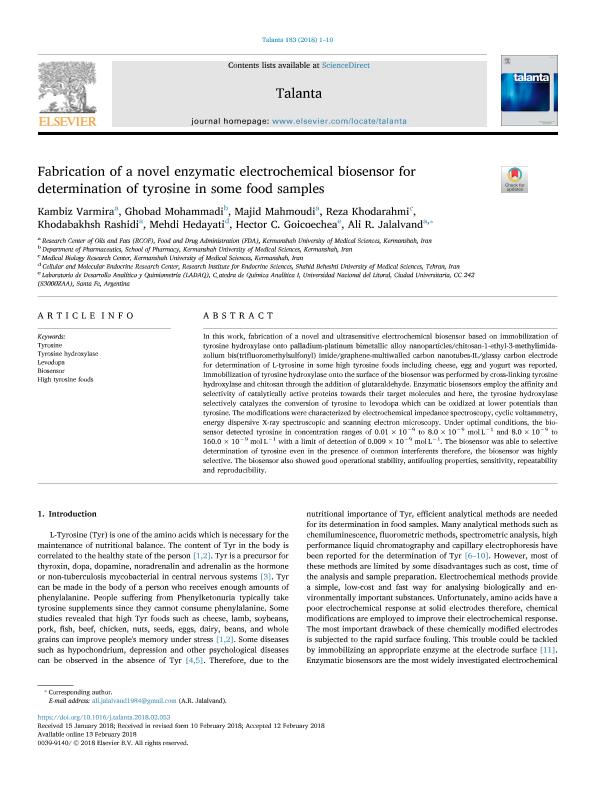Artículo
Fabrication of a novel enzymatic electrochemical biosensor for determination of tyrosine in some food samples
Varmira, Kambiz; Mohammadi, Ghobad; Mahmoudi, Majid; Khodarahmi, Reza; Rashidi, Khodabakhsh; Hedayati, Mehdi; Goicoechea, Hector Casimiro ; Jalalvand, Ali R.
; Jalalvand, Ali R.
 ; Jalalvand, Ali R.
; Jalalvand, Ali R.
Fecha de publicación:
06/2018
Editorial:
Elsevier Science
Revista:
Talanta
ISSN:
0039-9140
Idioma:
Inglés
Tipo de recurso:
Artículo publicado
Clasificación temática:
Resumen
In this work, fabrication of a novel and ultrasensitive electrochemical biosensor based on immobilization oftyrosine hydroxylase onto palladium-platinum bimetallic alloy nanoparticles/chitosan-1-ethyl-3-methylimidazolium bis(trifluoromethylsulfonyl) imide/graphene-multiwalled carbon nanotubes-IL/glassycarbon electrode for determination of L-tyrosine in some high tyrosine foods including cheese, egg and yogurtwas reported. Immobilization of tyrosine hydroxylase onto the surface of the biosensor was performed bycross-linking tyrosine hydroxylase and chitosan through the addition of glutaraldehyde. Enzymatic biosensorsemploy the affinity and selectivity of catalytically active proteins towards their target molecules and here, thetyrosine hydroxylase selectively catalyzes the conversion of tyrosine to levodopa which can be oxidized atlower potentials than tyrosine. The modifications were characterized by electrochemical impedancespectroscopy, cyclic voltammetry, energy dispersive X-ray spectroscopic and scanning electron microscopy.Under optimal conditions, the biosensor detected tyrosine in concentration ranges of 0.01×10-9 to 8.0×10-9 molL-1 and 8.0×10-9 to 160.0×10-9 mol L-1 with a limit of detection of 0.009×10-9 mol L-1. The biosensor was ableto selective determination of tyrosine even in the presence of common interferents therefore, the biosensor washighly selective. The biosensor also showed good operational stability, antifouling properties, sensitivity,repeatability and reproducibility.
Palabras clave:
Tyrosine
,
High tyrosine foods
,
Levodopa
,
Biosensor
Archivos asociados
Licencia
Identificadores
Colecciones
Articulos(CCT - SANTA FE)
Articulos de CTRO.CIENTIFICO TECNOL.CONICET - SANTA FE
Articulos de CTRO.CIENTIFICO TECNOL.CONICET - SANTA FE
Citación
Varmira, Kambiz; Mohammadi, Ghobad; Mahmoudi, Majid; Khodarahmi, Reza; Rashidi, Khodabakhsh; et al.; Fabrication of a novel enzymatic electrochemical biosensor for determination of tyrosine in some food samples; Elsevier Science; Talanta; 183; 6-2018; 1-10
Compartir
Altmétricas



